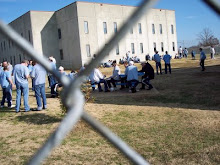

Those of you who have previously written me off as an ascetic and a crank can just skip this post...nothing new here folks, move along!
Recently I saw a blog post which included a comment about being entertained by Paige Patterson and Mrs Patterson at "Pecan Manor." That's the mansion provided for the President of South Western Baptist Theological Seminary in Ft Worth.
That picture of the house was taken by Dr Al Mohler, President of Southern Baptist Theological Seminary at Louisville. He also took this picture of the mansion he lives in there....(on the right).
So, I'm wondering why it is necessary for the "Church" to provide luxurious living like this for its leadership? These guys are not President of General Motors (ooops, bad example.....showing my age)...these are servants of Christ's church.
Financial data on such situations is hard to come by. I'm good at "finding stuff" by searching the internet....I can find your phone number, address, maybe a picture of your house or at least the street you live on; I can find out how much the President of AIG makes.....but I sure can't find out what these two fellows are paid. It's even tough to find out what some Big Name pastors are paid....their salary is lumped into large budget categories, thus obscured, like "Preaching Ministry" $1,000,000. That could include 3 or 4 salaries, for example.
I'm trying to keep this short. I'd like some discussion. And I'm not picking on Al Mohler or Paige Patterson.....they were just in the room when the thought hit me. They are not the problem; they are just in a problem-fraught system.
Thinking about the book of Amos. "Come to Bethel and transgress" In chapter 4, Beth-El "the place of God" had become representative of corrupted religion.
"Hear, and testify against the house of Jacob," declares the Lord GOD, the God of hosts, "that on the day I punish Israel for his transgressions, I will punish the altars of Bethel, and the horns of the altar shall be cut off and fall to the ground. I will strike the winter house along with the summer house, and the houses of ivory shall perish, and the great houses shall come to an end," declares the LORD.
(Amos 3:13-15)
In this world populated with lost souls and impoverished men, it is incomprehensible to me how the "Church" can possibly justify corporate-level salaries and aristocratic mansions for the leadship...leadership which according to Biblical example is humble and self-sacrificing....in a Church where those who "had" were willing to sell all and give to those who "had not"
We've come a long way.......
We've come to Bethel.








7 comments:
Dr. Mohler does not own the home that he lives in. The property was deeded to the seminary on the condition that the President reside there. As I do not know of the personal circumstances of Dr. Paterson, so I’ll remain silent on that point.
After that, I tend to agree with you. The church at large has, over the years, spent money rather ostentatiously on edifices intended to bring glory to God, when in fact, God seems to be all about restoring relationships -- man to man and man to God -- through the completed atoning work of Jesus Christ.
Whether or not the buildings we construct assist with that process has probably never been researched adequately, and many seem to assume that those buildings do not aid in kingdom work. I believe that point may be debated. The buildings may indeed assist with the process of restoration and redemption, if for no other reason to gather people together for the purpose of seeking God.
I’ve also not seen where asceticism is the more holy position, though certainly some people have made it seem so down through the ages. I do note that even the most ascetic of monks tended to live in castles…
I think we all know that those men do not own the houses; as I said, this is not about them.
The idea that these castles can somehow assist in spreading the Gospel is so ludicrous that I think no "research" is necessary....can't recall any Biblical instruction which included "spend most of your money on huge buildings, maintenance and staff, in order to demonstrate the Gospel."
And, thanks for including me with the ascetics! I needed a good laugh this morning. It is so predictable: anytime one challenges the love of money and worldly goods demonstrated by the "church" the "ascetic" charge is soon to follow...LOL. Let me remind you, those monks did NOT own those castles.... :)
Well, actually they did (Monks own the castles). But that isn't the point, is it.
What I had in mind when I questioned whether buildings might play a roll in the building of God's kingdom starts with the Scriptures -- God asked Solomon to build Him a temple -- a magnificent artifact, clad in gold, the utmost in decadence from a human perspective. The money could have been used (as always, Jesus reminded us) to feed the poor or extend the mission, but God said, "Build a temple," and even specified in very close order the details.
Of course, the Temple could be spiritualized, seen as a "type" or "shadow" of the Temple of the Lord to come -- that shining light on the hill we know as Jesus Christ. But it also had very human importance: as a gathering place for God's people, as an edifice built to glorify God, as something so remarkable and amazing that people in all the surrounding lands would be drawn to come and see...
That same thought translates to the magnificent cathedrals scattered throughout Europe -- at once the home of a church that lost her way -- and the repository of God's Word and the remnant that eventually was born of the Holy Spirit into the Reformation.
As a church planting pastor, I've seen people groups that see the church building as a critical part of God's kingdom work, and without a structure that stands over and above the run of the mill structures in a community, they simply do not see "church." Is that right or wrong? I can't really say. I'd like to say "wrong," but that's the target culture, so we use what is to reach the people God gave us to reach.
Again, we can spiritualize the building (or not) and still end up missing the main point, which is doing what Jesus told us to do. If that takes a structure, so be it.
Will those structures burn one day? Yup. In the mean time, can they be used for up-building the kingdom? Yup.
I don't think one needs to "spiritualize" the Temple in order to avoid using that as justification for million-dollar edifices in which the local church meets....simply two different things altogether. The Temple was the place where God met men...not so in the NT economy. The "church" is not a building.
Any group which views a building as a "critical part" of God's work is clearly demonstrating a non-Biblical worldview. I should hate to see that encouraged by any Christian, preacher or not.
On a personal note, since you are a minister of the Gospel and a church planter, why do you conceal your identity behind a pseudonym and blocked profile? I am violating my own rule about not posting anonymous comments because, in your case, you are at least civil and rational (unlike some...lol) but I am mystified by the unwillingness of men to claim their words openly.
I didn't realize that I was concealing my name or profile in any way. My user name is glfredrick-- my real name. You can google me and find my work all over the web. I'm on Facebook under the Guy Fredrick. I probably didn't fill out a profile for Google, as I seldom use that account except for as a backup email box for blogs.
Buildings have always been a vital part of God's church -- whether homes (I recall Jesus ministry was supported by rich widows, it is presumed that they had homes), temples, or yes, church buildings. As I said eariler, we need to keep them in proper perspective -- buildings are tools to be used -- not items worshipped or used to reach God (c.f., the Tower of Babel).
I still see no biblcal admonition against buildings used for the purpose of serving the church. I'm also not wanting to start any major fight with you -- like I said in my first response, I actually side with you against some of the excesses I see in this regard -- but I will ask you to demonstrate biblically your position that: "Any group which views a building as a "critical part" of God's work is clearly demonstrating a non-Biblical worldview."
And, I'll also ask you to note that I mentioned that I had worked with "people groups" that thought this way. Note my statement after that, "Is that right or wrong? I can't really say. I'd like to say "wrong," but that's the target culture, so we use what is to reach the people God gave us to reach."
Thanks for the explanation re your name. I have this set up so that commenters have to be registered. Your registration shows only "Guy" with blocked access to your Blogger profile--end result: Guy is all that's revealed. I have been plagued with a certain group registering solely for the purpose of "telling me off" on a particular article here, using initials or pseudonyms... so I'm overly sensitive...lol.
Like you, I think we're close on this. I'm all for buildings. I'm just not convinced that they need to be palatial and/or designed to "impress" the world. For one thing, it gives rise to the thought that "ministry" is restricted to the inside of that wonderful castle on the corner......when in fact, 99% of ministry takes place out in the streets (or should). A one million dollar building should do the same job as a 25 million dollar one....keep the rain off the saints who are meeting there.
(I can be found on Facebook as well--Ed Franklin)
On that note, I believe we agree. I do note that we cannot stop those who have built previously, and through their gift of giving have given such buildings to the church, but we ought not be pursuing those sorts of buildings "just because we can" and have a desire to impress the world.
Like you, however, I am rather sensitized about a few issues, one being the campus of Southern Seminary. The campus (and this holds true for other campuses as well) has been the beneficiary of gracious and generous givers that have it in their hearts to lavishly gift the campus with buildings, books, endowed chairs, etc., all out of gratitude for the work that is or has been performed at that institution. I am one of the recipients of that work, and I am grateful for those who have given as they have.
Post a Comment